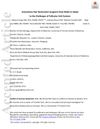Changing Trends in Surgical Hair Restoration: Use of Google Trends and the ISHRS Practice Census Survey
September 2020
in “
Journal of Cosmetic Dermatology
”

TLDR More people are searching for hair transplants online, preferring Follicular Unit Excision over Follicular Unit Transplant. There's also a rise in female patients and interest in beard, eyebrow transplants, and non-surgical treatments like platelet rich plasma.
The study "Changing trends in surgical hair restoration: Use of Google Trends and the ISHRS practice census survey" analyzed global trends in hair restoration treatments using data from the International Society of Hair Restoration Surgeons and Google Trends. The study found an increase in internet searches for "hair transplant" from 2004 to the present. It also noted a shift in preference from Follicular Unit Transplant (FUT) to Follicular Unit Excision (FUE) as a hair transplant method. There has been an increase in both surgical and non-surgical female patients since 2004. Beard and eyebrow transplants have also gained popularity. Non-surgical treatments like platelet rich plasma (PRP) are being searched more frequently. The study concluded that technological advances, changes in hair fashion, and global events directly impact hair restoration treatments offered by physicians and researched by patients.










